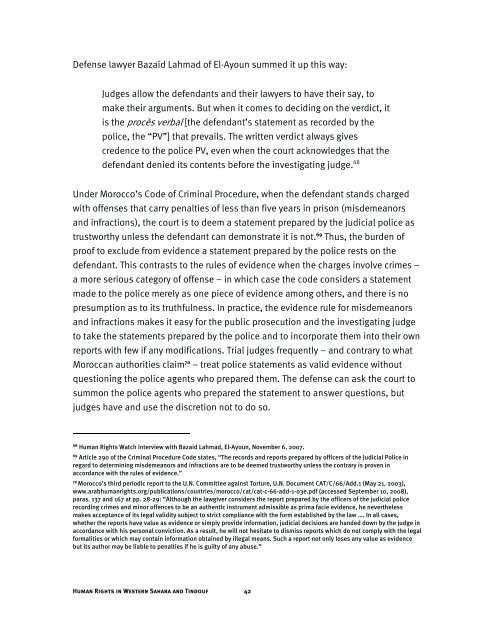Download full report with cover - Human Rights Watch
Download full report with cover - Human Rights Watch
Download full report with cover - Human Rights Watch
Create successful ePaper yourself
Turn your PDF publications into a flip-book with our unique Google optimized e-Paper software.
Defense lawyer Bazaid Lahmad of El-Ayoun summed it up this way:<br />
Judges allow the defendants and their lawyers to have their say, to<br />
make their arguments. But when it comes to deciding on the verdict, it<br />
is the procès verbal [the defendant’s statement as recorded by the<br />
police, the “PV”] that prevails. The written verdict always gives<br />
credence to the police PV, even when the court acknowledges that the<br />
defendant denied its contents before the investigating judge. 68<br />
Under Morocco’s Code of Criminal Procedure, when the defendant stands charged<br />
<strong>with</strong> offenses that carry penalties of less than five years in prison (misdemeanors<br />
and infractions), the court is to deem a statement prepared by the judicial police as<br />
trustworthy unless the defendant can demonstrate it is not. 69 Thus, the burden of<br />
proof to exclude from evidence a statement prepared by the police rests on the<br />
defendant. This contrasts to the rules of evidence when the charges involve crimes –<br />
a more serious category of offense – in which case the code considers a statement<br />
made to the police merely as one piece of evidence among others, and there is no<br />
presumption as to its truthfulness. In practice, the evidence rule for misdemeanors<br />
and infractions makes it easy for the public prosecution and the investigating judge<br />
to take the statements prepared by the police and to incorporate them into their own<br />
<strong>report</strong>s <strong>with</strong> few if any modifications. Trial judges frequently – and contrary to what<br />
Moroccan authorities claim70 – treat police statements as valid evidence <strong>with</strong>out<br />
questioning the police agents who prepared them. The defense can ask the court to<br />
summon the police agents who prepared the statement to answer questions, but<br />
judges have and use the discretion not to do so.<br />
68 <strong>Human</strong> <strong>Rights</strong> <strong>Watch</strong> interview <strong>with</strong> Bazaid Lahmad, El-Ayoun, November 6, 2007.<br />
69 Article 290 of the Criminal Procedure Code states, “The records and <strong>report</strong>s prepared by officers of the Judicial Police in<br />
regard to determining misdemeanors and infractions are to be deemed trustworthy unless the contrary is proven in<br />
accordance <strong>with</strong> the rules of evidence.”<br />
70 Morocco’s third periodic <strong>report</strong> to the U.N. Committee against Torture, U.N. Document CAT/C/66/Add.1 (May 21, 2003),<br />
www.arabhumanrights.org/publications/countries/morocco/cat/cat-c-66-add-1-03e.pdf (accessed September 10, 2008),<br />
paras. 137 and 167 at pp. 28-29: “Although the lawgiver considers the <strong>report</strong> prepared by the officers of the judicial police<br />
recording crimes and minor offences to be an authentic instrument admissible as prima facie evidence, he nevertheless<br />
makes acceptance of its legal validity subject to strict compliance <strong>with</strong> the form established by the law …. In all cases,<br />
whether the <strong>report</strong>s have value as evidence or simply provide information, judicial decisions are handed down by the judge in<br />
accordance <strong>with</strong> his personal conviction. As a result, he will not hesitate to dismiss <strong>report</strong>s which do not comply <strong>with</strong> the legal<br />
formalities or which may contain information obtained by illegal means. Such a <strong>report</strong> not only loses any value as evidence<br />
but its author may be liable to penalties if he is guilty of any abuse.”<br />
<strong>Human</strong> <strong>Rights</strong> in Western Sahara and Tindouf 42


